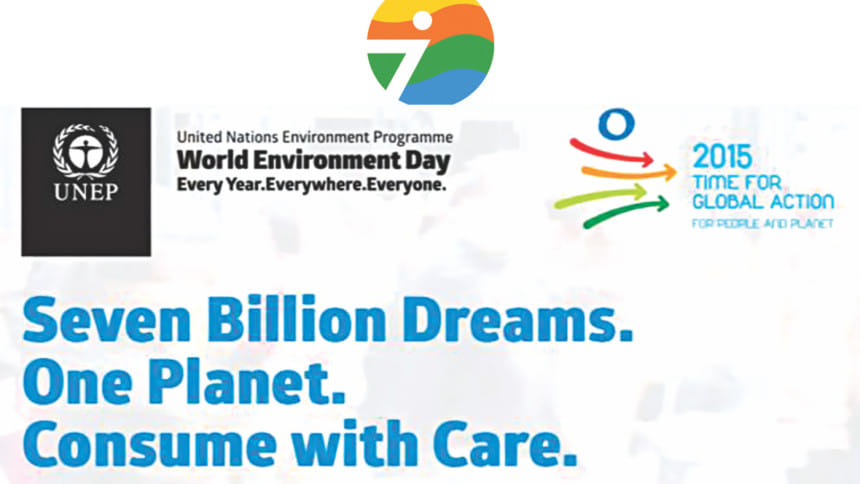A world of limited resources

Are we conscious about the trend of natural resource consumption to meet the needs of our current generation? Are we leaving behind enough resources for the future? The gas we burn for cooking, electricity generation, running vehicles and industries will be exhausted in a couple of decades. Our agricultural land is shrinking by one percent every year, our clean wate, air and soil are getting polluted at an alarming rate over time. Globally, each individual uses 16 kilos of resources extracted from earth every day - metal, fossil energy, and minerals. If you live in the western world, this number is much higher - up to 57 kilos of newly-mined minerals per day. On the biodiversity front, the International Union for Conservation of Nature has identified a frightening figure of over 200 animals including fish, amphibians, reptiles, birds and mammals to be threatened in Bangladesh.
Many of the Earth's ecosystems are nearing critical levels of depletion or irreversible change, pushed by high population growth and economic development. By 2050, if the current consumption and production patterns remain the same and with the rising population expected to reach 9.6 billion, we will need three planets to sustain our way of life. As key drivers of change in the post-2015 era, the world's 1.8 billion young people must be bolstered by robust national policies and innovative solutions to the challenges they faced.
The theme of this year's World Environment Day is "Seven Billion Dreams. One Planet. Consume with Care." Humanity continues to consume far more natural resources than the planet can sustainably provide. Many of the Earth's ecosystems are nearing critical tipping points. It is time for us to change.
The goal of sustainable development is to improve the quality of life for all people without increasing environmental degradation and compromising the resource needs of future generations. We can do this by shifting our consumption patterns toward goods that use less energy, water and other resources and by wasting less food.
Bangladesh needs proper rules for managing clean water and an effective implementation structure to ensure that canals, tributaries, rivers and wetlands can be effectively managed and protected where necessary. The demand for water, like many resources, is reaching critical levels. In fact, to produce a single sheet of paper, 10 litres of water is consumed, with 182 litres needed to manufacture a kilogram of plastic. Furthermore the global demand for water is expected to increase by 400 percent by 2050 in the manufacturing sector alone. The problem is increasingly clear. We live in a world with limited resources, where conservation and efficient use of these resources have become increasingly crucial.
It is not only individual citizens or the public sector who have the onus for long term and corrective actions, the private sector has an important role to play in improving the efficiency of resource use. Public-private partnerships can help drive substantial gains in this space. Inefficient resource use not only costs businesses money, but also use up valuable and limited common resources. Innovation is also crucial to drive change in resource consumption patterns. Aging technology and practices are by and large the primary culprits of wasteful use. With the support of the government and low cost financing, we can encourage the private sector to invest in technological upgrades that improve productivity, reduce wastage, increase efficiency and deliver improved economic benefits.
At the household level, the government has declared their vision to replace 30 million inefficient traditional cook-stoves with clean alternatives by 2030. Not only do these technologies reduce energy consumption, but there are broader benefits, including improved health for women. The government should look for greater opportunities to partner with the private sector to drive innovation and incentivise efficiency for the benefit of everyone. Economic growth does not have to cost the earth, we just need to explore ways to green our growth, to ensure resources continue to be available for future generations and for the long term prosperity of the nation.
I believe there are four major priorities that need to be addressed in Bangladesh:
1. Embed environmental sustainability, conservation and efficient use of natural resources as important cross cutting elements in the seventh Five Year Plan.
2. Enhance environmental governance through greater enforcement of existing laws, with active citizen participation, financial incentives and capacity building of different ministries with emphasis on local governments.
3. Promote sustainable consumption as a key citizen responsibility through education, learning and cultural exchange.
4. Greater engagement of the private sector in sustainable production and efficient resource utilisation through innovation of technology and learning from the experience of other countries.
This year represents a critical one for the globe. The governments across the world will meet to discuss transformational issues with the conference on Sustainable Development Goals in New York and Climate Change Agreement in Paris. Whilst we hope that strong and positive decisions are reached through these forums, we must take our own steps to preserve the environment. Let us celebrate World Environment Day by becoming more conscious of our ecological impact. Let us think about the environmental consequences of the choices we make. Let us become better stewards of our planet. After all, that's the only one we have till now.
(The opinions expressed here are the writer's own and may not be subscribed by UNDP or any of the member states that it represents.)
The writer is Assistant Country Director, United Nations Development Programme (UNDP)Bangladesh.

 For all latest news, follow The Daily Star's Google News channel.
For all latest news, follow The Daily Star's Google News channel. 



Comments